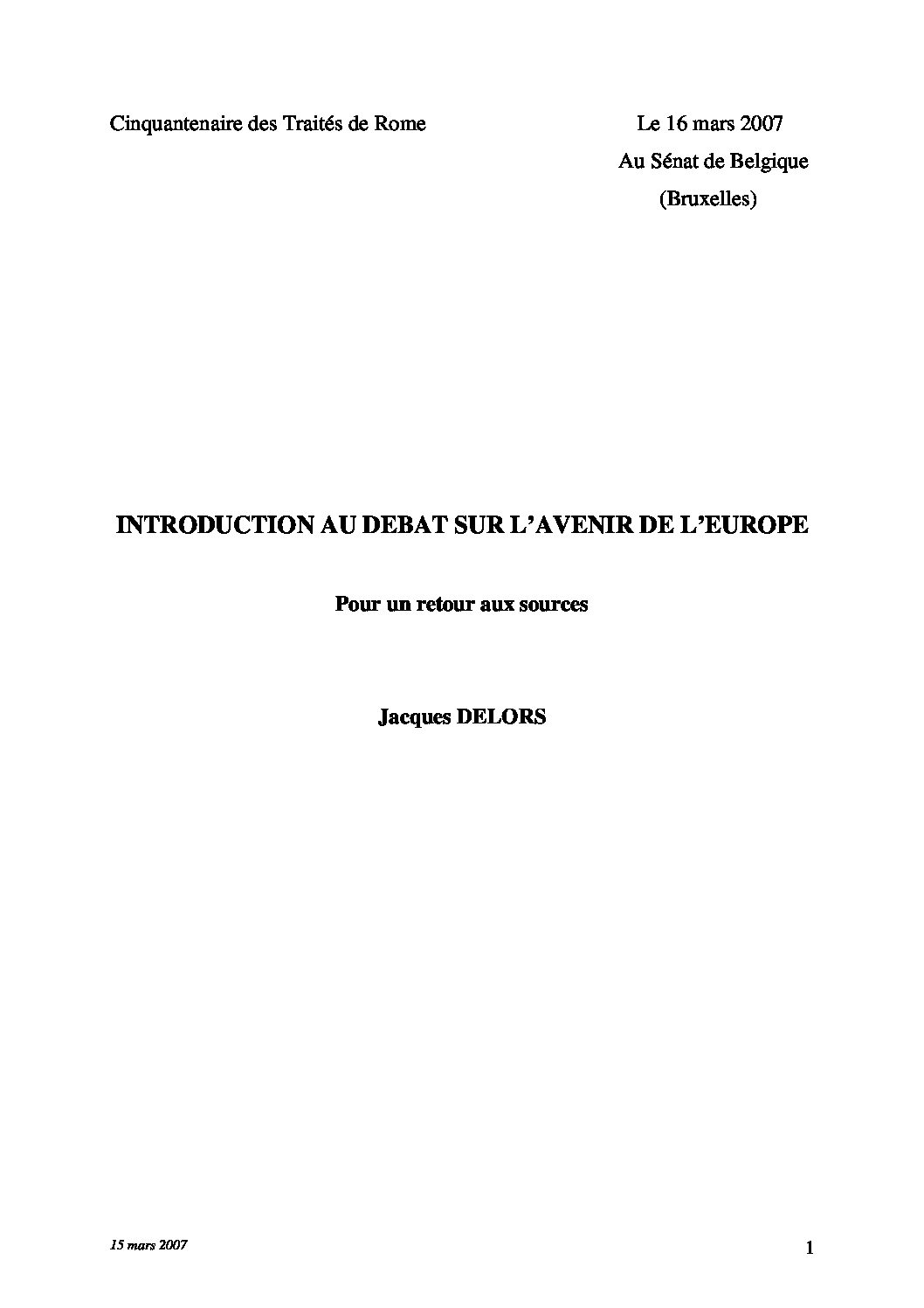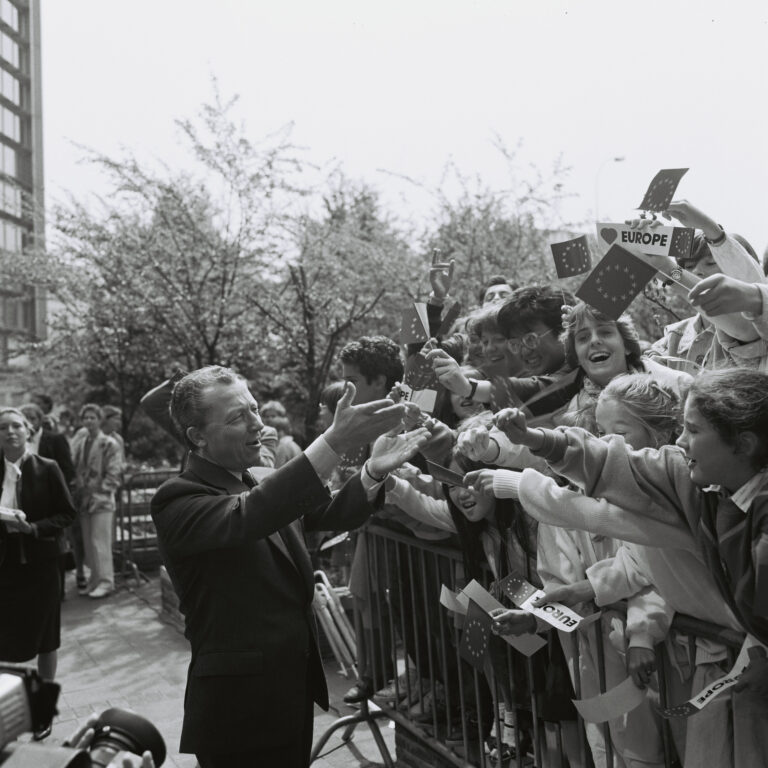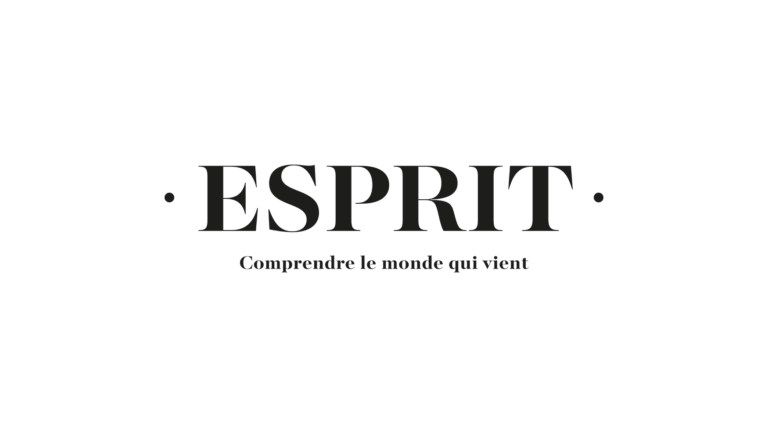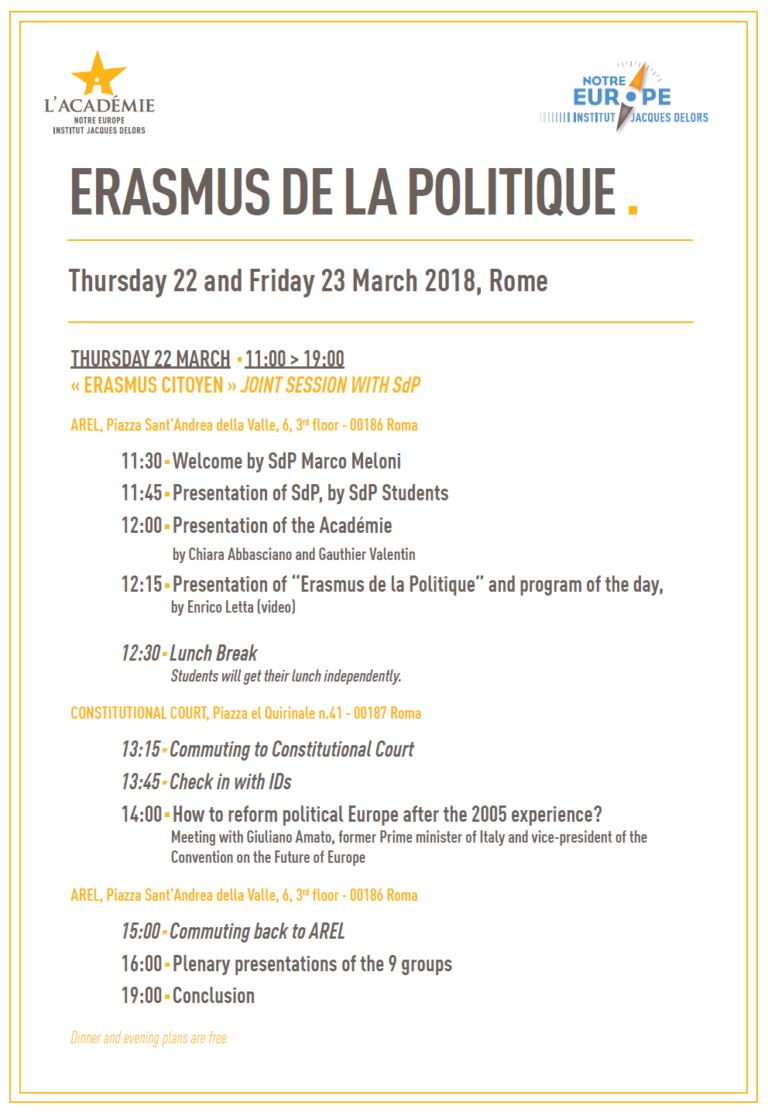Other document
Introduction to the debate on the future of Europe: Let’s go back to basics
Speech by Jacques Delors on the occasion of the fiftieth anniversary of the Treaty of Rome, at the Belgian Senate in Brussels, 16 March 2007
Speech by Jacques Delors on the occasion of the fiftieth anniversary of the Treaty of Rome, at the Belgian Senate in Brussels, 16 March 2007.
Non-official translation follows.
I am pleased and honoured to be here, among my Belgian friends, both elected officials and citizens, in order to commemorate the fiftieth anniversary of the Treaty of Rome. My experience of Belgium in Europe is simple: at every point in my career where I’ve needed to assess people’s loyalty to the spirit and and the details of the European project, the Belgian officials have always been up to the test.
We are gathered here at a moment when the European project is passing through a critical phase, and when everyone is hoping for and expecting a miracle solution to end the crisis. Unfortunately it is not as simple as that – otherwise our leaders would not be waiting for the ceremonies due between 16 and 25 March throughout Europe in order to find the keys to a breakthrough.
As I’ve often said in the past: “There is no future without memory”. This is not a simple pretext of a phrase used simply to justify the current celebrations. It is a historical truth, a fact demonstrated by all the difficulties caused by short-termist thinking, or by people’s refusal to take account of tradition, or, in a different spirit, by past tragedies and mistakes.
Hence the need to look back on these 50 years, which were not at all a golden age but which launched an adventure unique in history. Cooperation between sovereign nations resolved to work together through common institutions and in expression of common values, peace and mutual respect between peoples, the creation of a community of law to which every country defers, increasing cooperation in the areas of economic, social and foreign policy.
A historian of Europe, Bino Olivi, called his work, with good reason: “Difficult Europe”. How right he was, because Europe has never been easy. We must convince those who, not having experienced the immediate post-war years, tend today to consider a united Europe as an old-fashioned concept made obsolete by the events of the last few decades.
People have often predicted the end of the European experiment. And yet, it goes on. But this is not the story of a long, peaceful river.
It remains therefore relevant to remember the 1950s and the Treaty of Rome, and to think about this common platform which will allow us once more to move forward.
Clearly, nothing can be taken for granted. History is full of unexpected snags which undermine human achievements. We must be aware, therefore, of the consequences of going backwards – a situation all the more dangerous when one considers that it would not be the result of a bolt from the blue from the European Council, but rather the result of comfortable and guilty carelessness.
SUR LE MÊME THÈME
ON THE SAME THEME
PUBLICATIONS
The Jacques Delors Agora: Europe’s Next Generation

” Come on, courage, the Spring of Europe is still ahead of us ! ” Jacques Delors, Speech to the European Parliament, 19 January 1995

Declining birth rate in Europe

MÉDIAS
MEDIAS
Jacques Delors, Européen et Corrézien : “Au Parlement européen, il était une star !”

Jacques Delors : la France par l’Europe

Hommages européens à Jacques Delors, “bâtisseur” de l’Europe

ÉVÉNEMENTS
EVENTS
Building Europe differently [FR]

EUROPEAN DIPLOMACY AND THE UNION’S EXTERNAL ACTION [FR]

Des réponses européennes
à l’asile et aux migrations

Strasbourg, 17th September 2019 – Democracy and the Peace Building process

Paris, 29 January 2019 – Find the taste of European adventure

Paris, 29 January 2019 – Find the taste of European adventure

Amiens, 16 January 2019 – “Amiens plus grand” in Europe

Brussels, 7 December 2018 – Pays de la Loire in Europe

26 November 2018 – Round-table on Europe

Lourdes, 5 November 2018 – Identity and democracy, the future of Europe

Tournai, 27 October 2018 – Europe, I love you, me neither

Paris, 13 October 2018 – Citizen consultation: Is the EU condemned to powerlessness?

Brussels, 11 October 2018 – State of Europe 2018

Paris, 10 October 2018 – What is Europe for? Myths and realities

Paris, 4 October 2018 – Enrico Letta presents his book “Faire l’Europe dans un monde de brutes”

Paris, 2 October 2018 – Towards A New Capitalism: Fostering Inclusiveness

Paris, 18 September 2018 – A bike against Nazi barbarity

Neuilly-sur-Seine, 31 August 2018 – What Europe could bring to education and what education could bring to Europe?

Paris, 25 July 2018 – Salient European issues for 2019-2024

Bruges, 12 July 2018 – Negotiating the Energy Union

Paris, 11 July 2018 – Citizen consultation : what is Europe purpose?

Bruges, 3 July 2018 – Negotiating the Energy Union

Paris, 13 June 2018 – Whither European integration – Addressing EU internal and external challenges

Strasbourg, 1st June 2018 – Europe on trial: Who’s to blame for the break-up?

Paris, 16 May 2018 – Which values is the European Union bearing?

Paris, 12 and 13 May 2018 – European Day: Come and meet us!

Erasmus of Politics – Strasbourg cursus of the Académie Notre Europe trip to Rome

Sofia, 9 March 2018 – The future of the EU budget

Bordeaux, 25 January 2018 – 12th Franco-german dialogue

Paris, 12 February 2018 – Rebuilding Europe: what challenges?

Athens, 8 February 2018 – Athens’ days: Greece, paths for hope

Paris, 7 February 2018 – 59th Europartenaires Club

Paris, 7 February 2018 – Luncheon of the France-Italy Association

Paris, 2 February 2018 – How to deal with the populist phenomenon?

Brussels, 16 January 2018 – Europe’s challenges in 2018

Blois, 22 November 2017 – Where is Europe heading toward?

Rome, 27-29 October 2017 – (Re)thinking Europe

Boulogne-Billancourt, 2 October 2017 – A New World?

Madrid, 22 September 2017 – Relaunching the European Union: A moment for action

Alpbach, 28 August, 2017 – The EU on trial: 60 years of conflict and cooperation in Europe

Boulogne-Billancourt, 25 April 2017 – Europe: where do we go now?

Paris, 22 March 2017 – Where is Europe heading to?

Berlin, 21 March 2017 – More capability to act through flexibility?

Brussels, 10 March 2017 – How to give body to the European project again?

Paris, 9 February 2017 – The Future of the Union

Paris, 26 January 2017, Commons for Europe

Brussels, 12 December 2016 – Yesterday’s and today’s European Union

Rotterdam, 21 November 2016 – Unity and efficiency

Paris, 24 October 2016 – Tribute to Emile Noël, Yesterday and today’s Europe

Paris, 8 September 2016 – A new territorial ambition for France in Europe

















